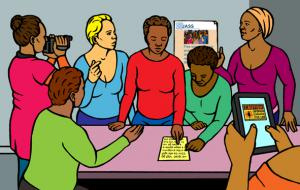
Co-created by Just Associates Southern Africa, Association for Progressive Communications and Women’sNet, South Africa
Amplify Women’s Voices!
ICTs impact us all, so we need to understand them, influence how they are developed, empower ourselves to use them and harness them to make a difference. Across the world, women are using information and communication technologies (ICTs) to support rights agendas, tell their own stories and challenge emerging issues in regard to access, women’s voices and violence. We can use ICTs for social, political and economic participation.
Building feminist communication strategies using ICTs helps us achieve movements that are effective, resilient, visible and safe. We know that much of our activism and organising happens and always will happen in person and “offline”. Linking to the tools of the online world, however, creates powerful ways to make visible our campaigns in new and wider spaces and to engage expanded networks of people.
About the toolkit
You can view and download the full ICT Toolkit for Feminist Movement Building by clicking here.
The toolkit aims to assist activists to think through their communication strategies in a way that supports movement building. It offers a practical guide to writing a communication strategy and reviews a number of tools (ICTs) and technology-related campaigns which can be used in organising work. In this toolkit, we draw on the experience and contexts of women activists in southern Africa and beyond. And while we focus on women’s rights activists, anyone who is part of a movement for social change will find it useful.
The toolkit is also about feminist practice and how to use tools and communicate in ways that are democratic, make women’s voices stronger and louder whilst challenging stereotypes and discriminatory social norms. We hope it will assist activists in making creative, safe and sustainable choices in using ICTs in our communication strategies.
The toolkit invites us to:
- experiment and be creative in the way you communicate
- think about how communications can help us to build movements for social justice
- develop a feminist communication strategy for your organisation that amplifies women’s voices and supports them to tell their own stories
- think about which ICTs to use and when
- adopt a feminist approach to your use and understanding of ICTs
- communicate in ways that challenge gender stereotypes
- think through safety and security concerns that women activists face when using technology
- understand how power works in design, governance and access to ICTs and challenge inequality in our world
- design a workshop for your organisation on ICTs and communications.
We invite you to explore the ICT Toolkit through a learning activity. We focus on Chapter 3 of the ICT Toolkit which is on Communicating for Feminist Movement Building.
Learning Activity: Essential elements of a feminist movement building communication strategy.
One element of a feminist movement building communications strategy is Amplifying women’s voices. storytelling is an effective way to get women to empower themselves by sharing their own stories.
Read the Case Study on page 40 of Chapter 3 of the ICT Toolkit, “Telling Herstory – Basali Amoho,” and respond to the questions below. While you are doing this activity, think about how this could apply to your communications in your activism.
It would be helpful to do this in a group and to share your experiences and explore the commonalities and differences and what the possible reasons are for these. Write a short blog, photograph, draw or record an audio clip of responses to these prompting questions and send to us at ideas@takebackthetech.net.
Ask yourself:
- Why did Basali Amoho choose storytelling as a strategy?
- What did they learn?
- What support did they need?
- What ICTs did they use?
- Why was consent so important?
- What did they use the stories for?
- What other ICTs could they have used?
Issue
- Log in to post comments
